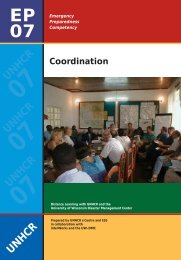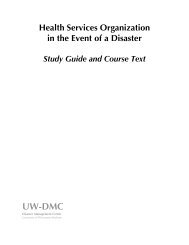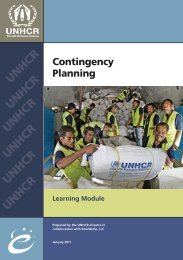Managing External Relations - Disaster Management Center ...
Managing External Relations - Disaster Management Center ...
Managing External Relations - Disaster Management Center ...
You also want an ePaper? Increase the reach of your titles
YUMPU automatically turns print PDFs into web optimized ePapers that Google loves.
EP<br />
04<br />
98<br />
<strong>Managing</strong> <strong>External</strong> <strong>Relations</strong><br />
Humanitarian Early Warning System (HEWS) identifies crises with humanitarian<br />
implications. Through multi-sectoral analysis of indicators, both long-term and shortterm,<br />
evaluation of trends and in-depth field-based information, HEWS informs decisionmakers<br />
at headquarters about the likelihood and extent of crises. An extensive database<br />
of base-line information for more than 100 countries supports this activity.<br />
Integrated Regional Information Network (IRIN): Since 1995, IRIN (Nairobi) has<br />
analysed and synthesised information on developments in the Great Lakes Region. It<br />
issues daily reports as well as thematic studies for over 2,000 primary subscribers in more<br />
than 50 countries. IRIN (Abidjan) was set up in 1997 and began providing similar reports<br />
covering West Africa. It is envisaged that IRIN will expand its coverage in 1998 to include<br />
Southern Africa, Central Asia and the Caucasus Region as well as the Balkans.<br />
Financial tracking: OCHA issues monthly reports on the response to appeals and natural<br />
disasters. This information is provided directly to humanitarian partners, including donors,<br />
and is available on ReliefWeb.<br />
The Department of Political Affairs (DPA)<br />
The following is on the World Wide Web at (http://www.un.org/Depts/dpa/docs/mission.htm)<br />
Mission of the Department of Political Affairs<br />
The mission of the Department of Political Affairs (DPA) is to provide advice and support<br />
on all political matters to the Secretary-General in the exercise of his global responsibilities<br />
under the Charter relating to the maintenance and restoration of peace and security.<br />
DPA accordingly:<br />
♦ monitors, analyses and assesses political developments throughout the world;<br />
♦ identifies potential or actual conflicts in whose control and resolution the United<br />
Nations could play a useful role;<br />
♦ recommends to the Secretary-General appropriate actions in such cases and executes<br />
the approved policy;<br />
♦ assists the Secretary-General in carrying out political activities decided by him and/or<br />
mandated by the General Assembly and the Security Council in the areas of preventive<br />
diplomacy, peace-making, peace-keeping and post-conflict peace-building;<br />
♦ provides the Secretary-General with advice on requests for electoral assistance<br />
received from Member States and co-ordinated implementation of programmes<br />
established in response to such requests;<br />
♦ provides the Secretary-General with briefing materials and supports him in the<br />
political aspects of his relations with Member States;<br />
♦ provides substantive support and Secretariat services to the Security Council and<br />
its subsidiary organs, as well as to the Committee on the Exercise of the Inalienable<br />
Rights of the Palestinian People and the Special Committee on the Situation with<br />
regard to the Implementation of the Declaration on the Granting of Independence<br />
to Colonial Countries and People.<br />
The Department of Peace Keeping Operations (DPKO) is responsible for planning, preparing,<br />
conducting, and directing UN peacekeeping operations, based on Security Council decisions. The<br />
following information is on the World Wide Web at (http://www.un.org/Depts/dpko/faq.htm)<br />
UN PEACEKEEPING: Some Questions and Answers<br />
United Nations Peacekeepers, wearing distinctive UN blue helmets or berets, are dispatched<br />
by the Security Council to help implement peace agreements, monitor cease-fires,<br />
patrol demilitarised zones, create buffer zones between opposing forces, and put fighting<br />
on hold while negotiators seek peaceful solutions to disputes. But ultimately, the success of<br />
peacekeeping depends on the consent and co-operation of the opposing parties.








